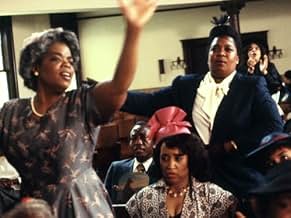Es la crónica de la fuerza comunitaria de siete mujeres negras diversas que viven en casas alquiladas en decadencia en una calle amurallada de un barrio urbano.Es la crónica de la fuerza comunitaria de siete mujeres negras diversas que viven en casas alquiladas en decadencia en una calle amurallada de un barrio urbano.Es la crónica de la fuerza comunitaria de siete mujeres negras diversas que viven en casas alquiladas en decadencia en una calle amurallada de un barrio urbano.
- Nominado a 2 premios Primetime Emmy
- 2 premios ganados y 4 nominaciones en total
Argumento
¿Sabías que…?
- TriviaLynn Whitfield is 7 months older than Oprah Winfrey and 3 years older than Jackee although they are much older than she is in the film.
- ErroresThe length of Theresa's cigarette when she tells Lorraine that she has decided not to go to the party at the night club. This happens at the same time that the block party is going on outside.
- Citas
Mrs. Browne: You could afford much more if you hadn't dropped out of college.
Kiswana: I knew it, I knew you'd get around to that. You'll just never understand, will you?
Mrs. Browne: Understand what, baby?
Kiswana: That my place is here with my people.
Mrs. Browne: Melanie, what help could you possibly be to these people while you're living hand-to-mouth on a file clerk's check?
Kiswana: At least I'm here with day-to-day contact with my people, instead of being like you and Daddy and sitting over at Linden Hills with a terminal case of middle-class amnesia.
Mrs. Browne: You don't have to live in the slums to care, Melanie. You don't have to try to be something you're not.
Kiswana: God, I can't stand this!
[she gets up to stand in front of Mrs. Browne]
Kiswana: Trying to be something I'm not? Trying to be proud of my African heritage? If that's trying to be something I'm not, then that's fine. I'd rather be dead than be like you, a stuck up nigger who's ashamed of being black.
Mrs. Browne: My grandmother was a full-blooded Iroquois. My grandfather was a black from a long line of journeymen who lived in Connecticut since the establishment of the colonies. My father was a Bajan who came to this country a cabin boy on a merchant mariner.
Kiswana: [quietly] I know all that, Mama.
Mrs. Browne: [grabbing her fiercely by her shoulders] Then, know this. I am alive because of the blood of people who never scraped or begged or apologized for what they were. They asked only of one thing of this world: to be allowed to be. And I learned through the blood of these people that black isn't beautiful. It isn't ugly. It isn't kinky hair, It isn't straight hair; Black is just Black. It broke my heart when you changed your name. I gave you my grandmother's name, a woman who bore nine children and educated them all, who held off six white men with a shotgun when they tried to drag one of her sons to jail for "not knowing his place". And you needed to reach into an African dictionary to find a name that would make you proud. When I brought my babies home from the hospital, I swore to whatever gods that would listen, that I would use everything I had or could get so that that my children would be prepared to meet this world on its own terms, so that on one could make them ashamed of what they were or how they looked, whatever they were or however they looked. And Melanie, that's not white or red or black or purple. That's being a mother.
- ConexionesFeatured in The 41st Annual Primetime Emmy Awards (1989)
- Dragonborn64
- 13 jul 2021
- Enlace permanente
Selecciones populares
- How many seasons does The Women of Brewster Place have?Con tecnología de Alexa
Detalles
Contribuir a esta página








































